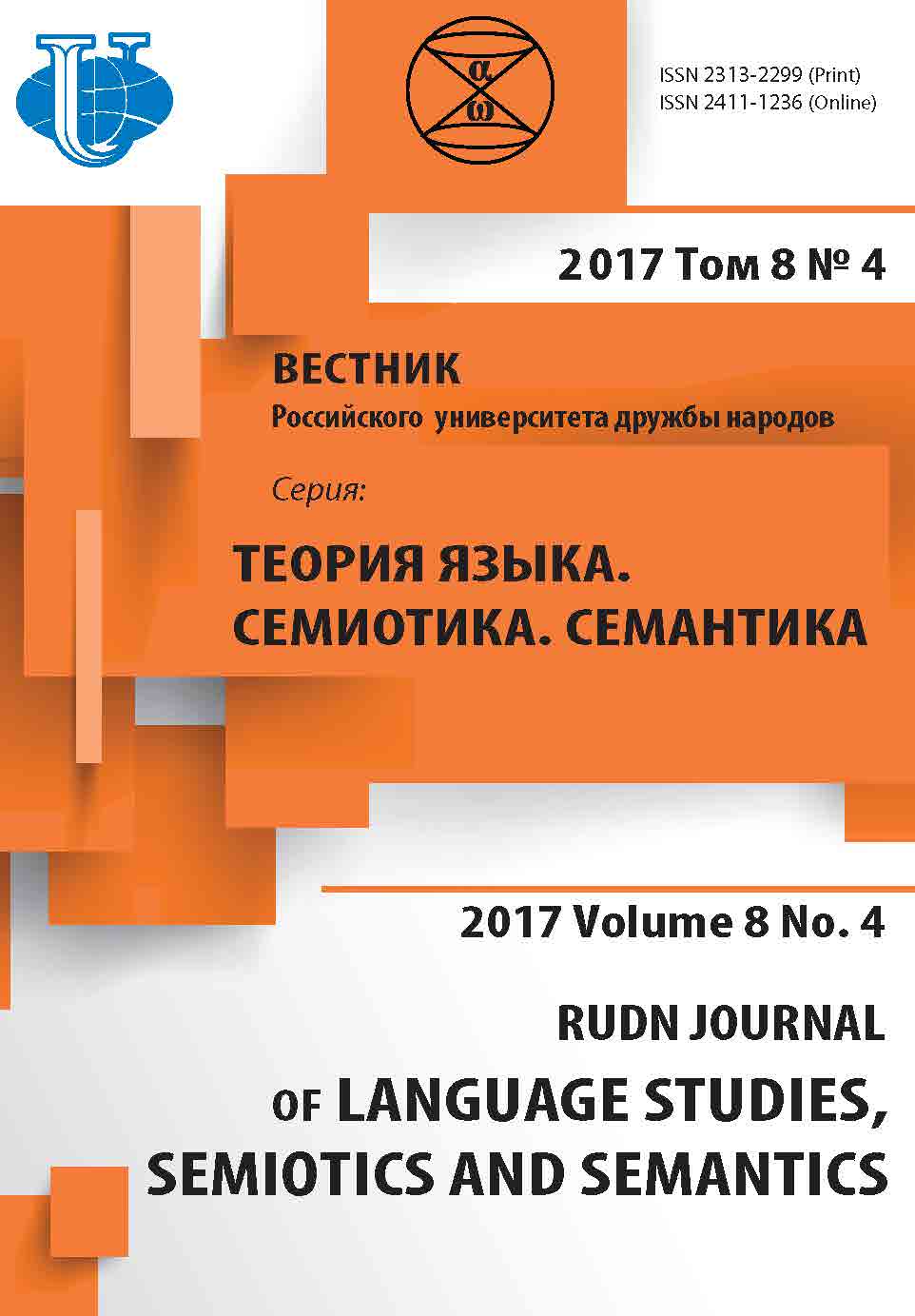TO THE PROBLEM OF METALINGUISTIC CONTEXTS IN MASS LITERATURE
- Authors: Batulina A.V1
-
Affiliations:
- The Novgorod State University named after Yaroslav the Wise
- Issue: Vol 8, No 4 (2017)
- Pages: 1041-1050
- Section: ARTICLES
- URL: https://journals.rudn.ru/semiotics-semantics/article/view/17985
- DOI: https://doi.org/10.22363/2313-2299-2017-8-4-1041-1050
- ID: 17985
Cite item
Full Text
Abstract
The article analyses metalinguistic contexts functions. The analysis is based on contempo-rary detective novels domestic authors. Two functional variations of metalinguistic contexts are discussed: communicative reflexives, which provide intellectual comfort for a common reader, and conceptual reflexives, which serve as a means of expression of author’s worldview judgments. Differences in the semantic structure of communicative reflexives, which contain a well - defined set of components, and conceptual reflexives, which are more complex and have a very diverse component compound are also described. Correlation between linguistic status of an object of reflection and the structure of its metalinguistic de-scription, objectified in regularly used for metalinguistic characterization, is identified. Various forms of actualization of metalinguistic contexts, which are considered evidence of social and communicative orienta-tion of mass literature authors on readers of different cultural and linguistic competence, are also analyzed in the article.
About the authors
Anna V Batulina
The Novgorod State University named after Yaroslav the Wise
Author for correspondence.
Email: b.av@bk.ru
Anna V. Batulina, Candidate of philological science, associate professor of the Chair Russian language GOU VPO NovSU named after Yaroslav the Wise; Interests: metalinguistic context, metalinguistic commentary, reflection, communicative reflexive, conceptual reflexive, mass literature
Bolshaya Sankt-Peterburgskaya str., 41, Velikiy Novgorod, Russia, 173003References
- non-linguistic texts). Logical analysis of language: the Image of man in culture and language. Mo scow. 146—161. (in Russ.).
- Mechkovskaya, N.B. (2009). History of the language and the history of communications from cuneiform to the Internet. Moscow. (in Russ. ).
- Vepreva, I.T. (2005). Linguistic reflection in the post-Soviet era. Moscow: OLMA-PR ESS. (in R uss.).
- Chernyak, V.D. & Chernyak, M.A. (2010.). Basic concepts of mass literature: the dictionarydirectory. Saint-Petersburg: Publishing house of the Herzen state pedagogical University. A.I. Herzen. (in Russ.).
- Karaulov, U.N. (1991). Status of the Russian language of modernity: proc. in proc. Russian language and modernity. Problems and prospects of development rosietici. and materials mail. discus., which was attended by Yu. d. Apresyan and others. Moscow. (in Russ. ).
- Schwarzkopf, B.S. (1977). The Problem of individual and social — group assessments of speech. Actual problems of speech culture. Moscow, 277—304. (in Russ.).
- Sumarina, M.R. (2011). In the mirror Language of a literary text. (Metalinguistic re flection in the works of Russian prose). Moscow: Flinta: Nauka. (in Russ.).
- Dontsova D. Dosye na kroshku Che: roman. M.: Eksmo. 2014.
- Dontsova D. Benefis martovskoy koshki: roman. M.: Eksmo. 2003.
- Dontsova D. D. Dontsova. Samovar s shampanskim: roman. M.: Eksmo. 2014.
- Dontsova D. Mylnaya skazka Shakherezady: roman. M.: Eksmo. 2011.
- Dontsova D. Fanatka gologo korolya: roman. M.: Eksmo. 2012.
- Dontsova D. Paltsy kitayskim veyerom: roman. M.: Eksmo. 2014.
- Dontsova D. Temnoye proshloye konka-gorbunka: roman. M.: Eksmo. 2014.
- Ustinova T. Otel posledney nadezhdy: roman. M.: Eksmo. 2008.
- Ustinova T. Gde-to na krayu sveta: roman. M.: Izdatelstvo «E». 2016.
- Dontsova D. Tormoza dlya bludnogo muzha: roman. M.: Eksmo. 2011
Supplementary files












